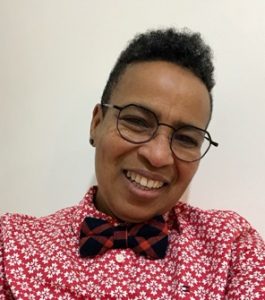This year’s Faculty of Education Summer Institute (FESI) will have a different look due to the unprecedented times that we are in. FESI 2020 - Up Close and Personal; Conversations on Anti-Oppression will be a free 5-part webinar series with an invitation to “take action”. The first webinar in the series will take place on August 19th.
“As is the tradition with this conference, FESI 2020 will continue to challenge and question long-held educational beliefs, policies and practices that have normalized inequities in education,” said assistant professor Vidya Shah who is also a member of the FESI organizing committee. “FESI 2020 has and will continue to address the ways in which anti-Blackness permeates our thinking and practice in education. Given the heightened global awareness of anti-Black racism, spurred by the unconscionable deaths of many members of the Black community, we recommit to centering the experiences and aspirations of Black students, families and communities in support of Black life.”

The first webinar in the series Designing for/with Criticality and Community, will take place on August 19th from 7 - 8:30 p.m. and will feature a discussion with panelists Kimberley Tavares, Elizabeth Tunstall and Natalie Wood who will share frameworks for how to engage community when thinking critically about curriculum, activism, policy and structures in education. Moderated by Shah, the guiding questions for the webinar are:
- Who and what influences how you think about curriculum, activism, policies and structures in the education system?
- How might you enhance your decision-making skills to better serve students who are most marginalized in the system?
 Tavares is an Education Officer, cross-appointed to the Education Equity Secretariat and the System Evidence and Design Branch, in the Ontario Ministry of Education. She serves as an Educational Policy & Systems Advisor and the Equity and Literacy Lead, respectively. Kimberley has been seconded from a vice-principalship in the York Region District School Board, and prior to this was an Equity Officer in the York Region Board serving students of African and Caribbean heritage. Much of Kimberley's work in the Ministry is to develop innovative tools and resources that work to dismantle the systemic barriers faced by many students in the Ontario education system.
Tavares is an Education Officer, cross-appointed to the Education Equity Secretariat and the System Evidence and Design Branch, in the Ontario Ministry of Education. She serves as an Educational Policy & Systems Advisor and the Equity and Literacy Lead, respectively. Kimberley has been seconded from a vice-principalship in the York Region District School Board, and prior to this was an Equity Officer in the York Region Board serving students of African and Caribbean heritage. Much of Kimberley's work in the Ministry is to develop innovative tools and resources that work to dismantle the systemic barriers faced by many students in the Ontario education system.
 Tunstall is a design anthropologist, public intellectual, and design advocate who works at the intersections of critical theory, culture, and design. As Dean of Design at Ontario College of Art and Design University, she is the first Black and Black female Dean of a Faculty of Design. She leads the Cultures-Based Innovation Initiative focused on using old ways of knowing to drive innovation processes that directly benefit communities. With a global career, Tunstall served as Associate Professor of Design Anthropology and Associate Dean at Swinburne University in Australia.
Tunstall is a design anthropologist, public intellectual, and design advocate who works at the intersections of critical theory, culture, and design. As Dean of Design at Ontario College of Art and Design University, she is the first Black and Black female Dean of a Faculty of Design. She leads the Cultures-Based Innovation Initiative focused on using old ways of knowing to drive innovation processes that directly benefit communities. With a global career, Tunstall served as Associate Professor of Design Anthropology and Associate Dean at Swinburne University in Australia.
 Wood is a Professor in the Service Work Program (SSW) at George Brown College (GBC) who often describes herself as wearing 3 kinds of bowties; She is a social innovation specialist, co-founder of the GBC Social Innovation Hub who designs and performs change within institutions and communities; A PhD student using her research time to challenge the devastating impact of anti-Black racism through documenting and developing Afro-Caribbean diasporic-inspired community organizations and models of empowerment, healing and inclusion; and she is an award-winning visual and multi-media artist.
Wood is a Professor in the Service Work Program (SSW) at George Brown College (GBC) who often describes herself as wearing 3 kinds of bowties; She is a social innovation specialist, co-founder of the GBC Social Innovation Hub who designs and performs change within institutions and communities; A PhD student using her research time to challenge the devastating impact of anti-Black racism through documenting and developing Afro-Caribbean diasporic-inspired community organizations and models of empowerment, healing and inclusion; and she is an award-winning visual and multi-media artist.
 Shah is an educator, scholar and activist committed to issues of equity and racial justice. She is an Assistant Professor in the Faculty of Education at York University and her research explores anti-racist approaches to educational leadership and school district reform. She has worked in the Model Schools for Inner Cities Program in the Toronto District School Board (TDSB) and was a teacher in the TDSB. She is also actively involved in community initiatives.
Shah is an educator, scholar and activist committed to issues of equity and racial justice. She is an Assistant Professor in the Faculty of Education at York University and her research explores anti-racist approaches to educational leadership and school district reform. She has worked in the Model Schools for Inner Cities Program in the Toronto District School Board (TDSB) and was a teacher in the TDSB. She is also actively involved in community initiatives.
Additional questions that will be addressed at future webinars include:
- How do current values and ideologies continue to subject youth to oppressive practices and pose barriers to achievement and well-being?
- How can all aspects of curriculum (including hidden and null curricula), teaching and learning perpetuate stereotypes, biases and assumptions about racialized, marginalized and Indigenous students?
- Which voices are consistently and historically ignored, silenced and omitted in our curriculum, classrooms, schools and communities?
- How have historical practices influenced current policies and practices that have manifested in discrimination, especially anti-Black racism and anti-Indigenous racism?
- How might the knowledge of families, students, staff and community partners be honoured and how can these groups be consulted and engaged in meaningful ways to imagine and enact different practices and beliefs in education?
- How might we promote and encourage collaboration, solidarity and movement building in the current climate of a global pandemic?
- What possibilities are being presented to us during these times to learn and support all learners?
“Our education system was founded on colonialism, white supremacy and other intersecting forms of oppression. If left unexamined, we continue to perpetuate these systems of oppression in our educational structures," says Shah. "FESI 2020 brings together community partners, educators, researchers and policy makers to think and collectively towards disrupting these long-standing inequities.”
Upcoming webinar dates for FESI 2020 are:
October 21, 2020 - Webinar 2
November 18, 2020 – Webinar 3
February 17, 2021 - Webinar 4
April 21, 2021 - Webinar 5
Register for Webinar 1 at https://bit.ly/3g4zrFN. For further information on FESI 2020 viisit https://fesi.blog.yorku.ca/.
